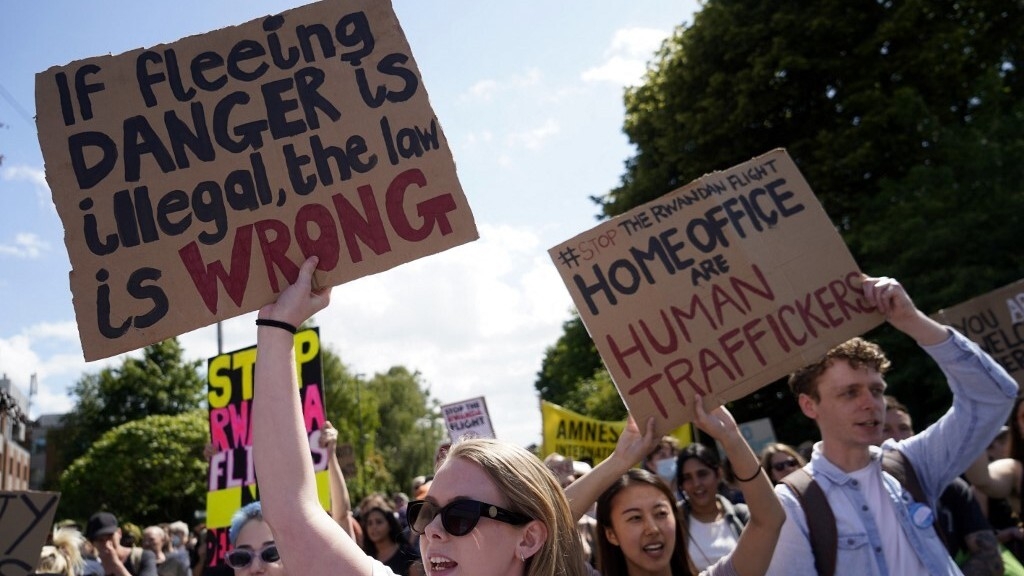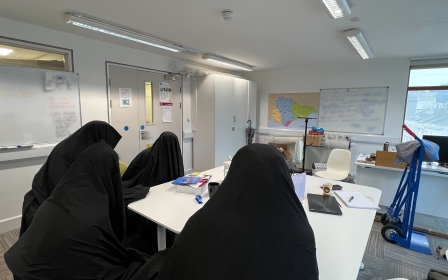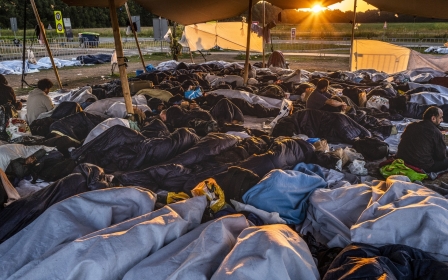UK: Asylum seekers 'fear for their lives' if Home Office moves them to Dunstable

Asylum seekers in a hotel in south London said they fear for their lives if the Home Office moves them at short notice to an area targeted by the far-right.
Speaking outside their hotel in Greenwich last week, the asylum seekers said the Home Office had moved many of their friends to a hotel in Bedfordshire without notice.
Previously housing at least 134 refugees, the asylum seekers said their hotel now holds at least 30 men from Afghanistan, Eritrea, India, Iraq, Sudan, Syria, and Yemen.
But in the last month, most men have been moved to a second hotel in Bedfordshire that has been targeted by the far-right, with police urging the asylum seekers not to leave the premises for their own safety.
But the dozens of men remaining in the Greenwich hotel said they feared that the lives that they have built over the last two years would be lost forever.
New MEE newsletter: Jerusalem Dispatch
Sign up to get the latest insights and analysis on Israel-Palestine, alongside Turkey Unpacked and other MEE newsletters
Some men have found communities that have welcomed them, given them food from their native homelands, begun studying at local colleges, and signed up for local health services where they have provisions like therapy and urgent medical care.
Building a life in South London
The names of the men who spoke to Middle East Eye have been changed for their safety as they await the outcome of their asylum claims.
Sami, a man in his mid-30s, described how he had built a life in south London since the UK Home Office placed him there.
“When we first came here, we had no one to turn to except the Home Office and hotel staff who gave us nothing but worry and grief,” said Sami, who has been in this South London hotel for nearly a year and a half.
'This hotel [in south London] is not ideal, but at least we can study and live an existence that resembles a life here'
- Abu Farah, asylum seeker
“But then charities like the Salvation Army provided us with money and clothes, helped us access services, and explained how to claim asylum here in Britain.
“When I first came here, I spoke little English. Only through my interactions with other people and charities coming to me did my English improve, and now they want to take us away from that support.”
The UK government typically provides asylum seekers with £8 a week. Charities sometimes give further funds to the individuals receiving help.
The government also pays a third-party contractor to manage the asylum seeker's accommodation and provide them with basic meals during their stay.
Abu Farah, also in his 30s, shared Salim’s angst and concern over plans to relocate him to Bedfordshire.
Having helped organise the asylum seekers to protest the move, Abu Farah said many of the men are anxious about what the future holds for them and afraid that threats from the far-right will trap them inside their new accommodation in Bedfordshire.
“We are still in contact with many of the people who used to live with us, and they tell us that the police and security are outside the hotel telling them not to go out too much,” said Abu Farah.
“It sounds like prison. What kind of existence is this? This hotel [in south London] is not ideal, but at least we can study and live an existence that resembles a life here.”
Mona Bani founded Revoke, a local charity that helps refugee children and asylum seekers, and said the stability many of the men had found for the first time in years at the hotel was being swept away from them, often at a moment's notice.
"We're talking about completely transient people that have probably been on the move for three to five years trying to find safety and shelter and finally found some stability through no fault of their own in the hotel," Bani told MEE.
"We have dealt with dispersals or potential dispersals, and it's always short notice when a person has yet to be consulted in any way or know where they will be moved until a van or bus turns up.
Bani also highlighted how many of the men have been receiving mental health care catered to their cultural needs, and who faced losing that provision if the Home Office moves them to a remote town that does not have an ethnically diverse population.
"There are waiting lists, and if you have been here for a year and a half and finally found a therapist - you lose that. And when you move, you are back to square one.
"Those [mental] health services are widespread in London and sometimes difficult to replicate and be culturally aware of their circumstances and the trauma of displacement."
Not 'luxury hotels'
The placing of asylum seekers in hotels has become a hot-button issue in British politics.
The government has pledged to end the practice, which costs many millions of pounds per year, amid protests against establishments hosting asylum seekers.
In February, asylum seekers who were moved from the hotel in Greenwich to Dunstable said they were afraid to leave their hotel after locals filmed them when they went for a walk in the park.
According to the Guardian, far-right group Patriotic Alternative has been leafleting the Dunstable area with leaflets that named the hotel housing the asylum seekers and the slogan: "You pay, migrants stay."
Earlier this year, members of Patriotic Alternative leafleted an area in Merseyside and also clashed with pro-refugee activists after residents held a violent demonstration outside a hotel housing asylum seekers.
The violent protest occurred after rumours spread that some male asylum seekers had propositioned a teenage girl in the area.
Leaflets at the protest claimed that asylum seekers stayed at “five-star hotels as Brits freeze".
Bani emphasises that it's a common misconception by the British public that asylum seekers placed in hotels in hotels are in luxury accommodations.
"People have a particular image of asylum seekers living in these hotels as luxurious. We're not talking about special hotels. These hotels are often chain hotels and spaces designed for temporary living and not a prolonged period of time, like a year," said Bani.
"These asylum seekers often live in shared rooms where they don't have individual spaces, no access to kitchen facilities, and no autonomy given that they have to eat and sleep at the behest of when food gets delivered to their hotel."
The UK Home Office said it did not comment on operational arrangements for individual sites but said it engaged with local authorities as "early as possible" when booking specific hotels.
"The number of people arriving in the UK who require accommodation has reached record levels and has put our asylum system under incredible strain," a Home Office spokesperson told MEE.
"The use of hotels to house asylum seekers is unacceptable - there are currently more than 45,500 asylum seekers in hotels costing the UK taxpayer £6 million a day.
"The use of hotels is a temporary solution, and we are working hard with local authorities to find appropriate accommodation."
Middle East Eye delivers independent and unrivalled coverage and analysis of the Middle East, North Africa and beyond. To learn more about republishing this content and the associated fees, please fill out this form. More about MEE can be found here.




